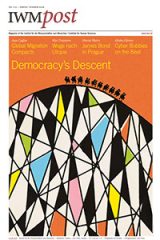

In collaboration with
Institute for Human Sciences
The Institute for Human Sciences / Institut für die Wissenschaften vom Menschen (IWM) is an independent institute for advanced study in the humanities and social sciences. Since its foundation in 1982, it has hosted more than 1500 scholars, journalists and translators from all over the world. Many of the Institute’s Permanent and Visiting Fellows are regular contributors to Eurozine or its focal points The World in Pieces and Ukraine in European Dialogue (see below).
Website: www.iwm.at
Twitter: @IWM_Vienna
Youtube: IWMVienna

Articles
Russia’s authoritarian regime owes its tenacity to the reversal of two central communist precepts, writes Ivan Krastev. First, its abandonment of the ideology of public interest prevents it being measured against its own standards. Second, its policy of open borders diffuses protest potential from a dissatisfied middle class.
Notes on Hungary's media law package
(Updated following the agreement with the European Commission)
Hungary’s media law could lead to a depoliticisation of the media the likes of which exists in Russia and in other post-Soviet democracies, writes the former OSCE Representative on Freedom of the Media. The alterations to the law on the basis of the agreement with the European Commission will do little to this halt this tendency.
Faith in the “efficient markets hypothesis” is largely to blame for the massive deregulation of the late 1990s and early 2000s that made the crisis more likely, if not inevitable. Two economists excoriate the ideology of self-regulating markets and its pseudo-scientific foundations.
The climate justice position is necessary but not sufficient for comprehending the current crisis, writes Dipesh Chakrabarty. As a geophysical force, the human species wields a new kind of agency unaccounted for in familiar narratives of the history of capitalist growth.
Focal points

Inspired by a lecture that Clifford Geertz delivered in 1995 at the Institute for Human Sciences in Vienna, this focal point engages with ‘deep diversity’, ‘a sense of dispersion, of particularity, of complexity and of uncenteredness’ rather than unified world order. It follows the launch of a research programme of the same name at the institute in January 2023.

Post-revolutionary Ukrainian society displays a unique mix of hope, enthusiasm, social creativity, collective trauma of war, radicalism and disillusionment. With the Maidan becoming history, the focal point ‘Ukraine in European Dialogue’ explores the new challenges facing the young democracy, its place in Europe, and the lessons it might offer for the future of the European project.
Projects and publications

